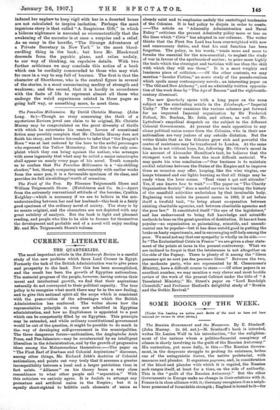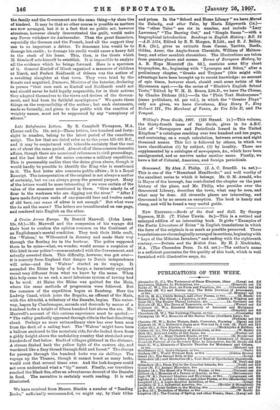SOME BOOKS OF THE WEEK.
[Under this lusting we =Bee much Books of the week as have net been reserved for review in other forms.] The Russian Government and the Massacres. By E. S6ranoff. (John Murray. 2s. lid. net.)—M. Semenoff's book is intended, writes Mr. Lucien Wolf in his introduction, "for the enlighten- ment of the nations whom a politico-financial conspiracy of silence is slowly involving in the guilt of the Russian Autocracy." His contention, put more fully, is this s—The Russian Govern- ment, in the desperate struggle to prolong its existence, bribes one of the antagonistic forces, the native proletariat, with massacre and plunder. It organises pogroms, and, in consideration of the blood and plunder with which it is regaled, the Russian mob ranges itself, at least for a time, on the side of authority. This is the "guilt of the Russian Autocracy." But the other Governments in Europe make no change in their relations with it. France is in close alliance with it; Germany recognises it s.s a neigh- bour possessed of formidable strength ; England is bound to it—for
the family and the Government are the same thing—by close ties Of kindred. It may be that no other course is possible as matters are now arranged, but it is a fact that no public act, however atrocious, however clearly demonstrated the guilt, would make any Power withdraw its Ambassador. Then the great financiers, especially the German and the French, lend all the support they Can to so important a debtor. To denounce him would be to 'damage his credit; to damage his credit would cause a heavy fall in the stock of his loans. This, then, is the thesis which M. Semenoff sets himself to establish. It is impossible to analyse all the evidence which he brings forward. Here is a specimen of it. General Kurloff of Minsk organised a massacre of children at Kursk, and Prefect Neidhardt of Odessa was the author of a revolting slaughter at that town. They were tried by the Senate and acquitted, Durnovo, Minister of the Interior, declaring in person "that men such as Kurloff and Neidhardt could not and should never be held legally responsible, for in their actions they adapted themselves to the views and desires of the Govern- ment, and had been its faithful mouthpieces." We quote these things on the responsibility of the author ; but such statements, made so formally, and given to the public with the sanction of weighty names, must not be suppressed by any "conspiracy of silence."























































 Previous page
Previous page